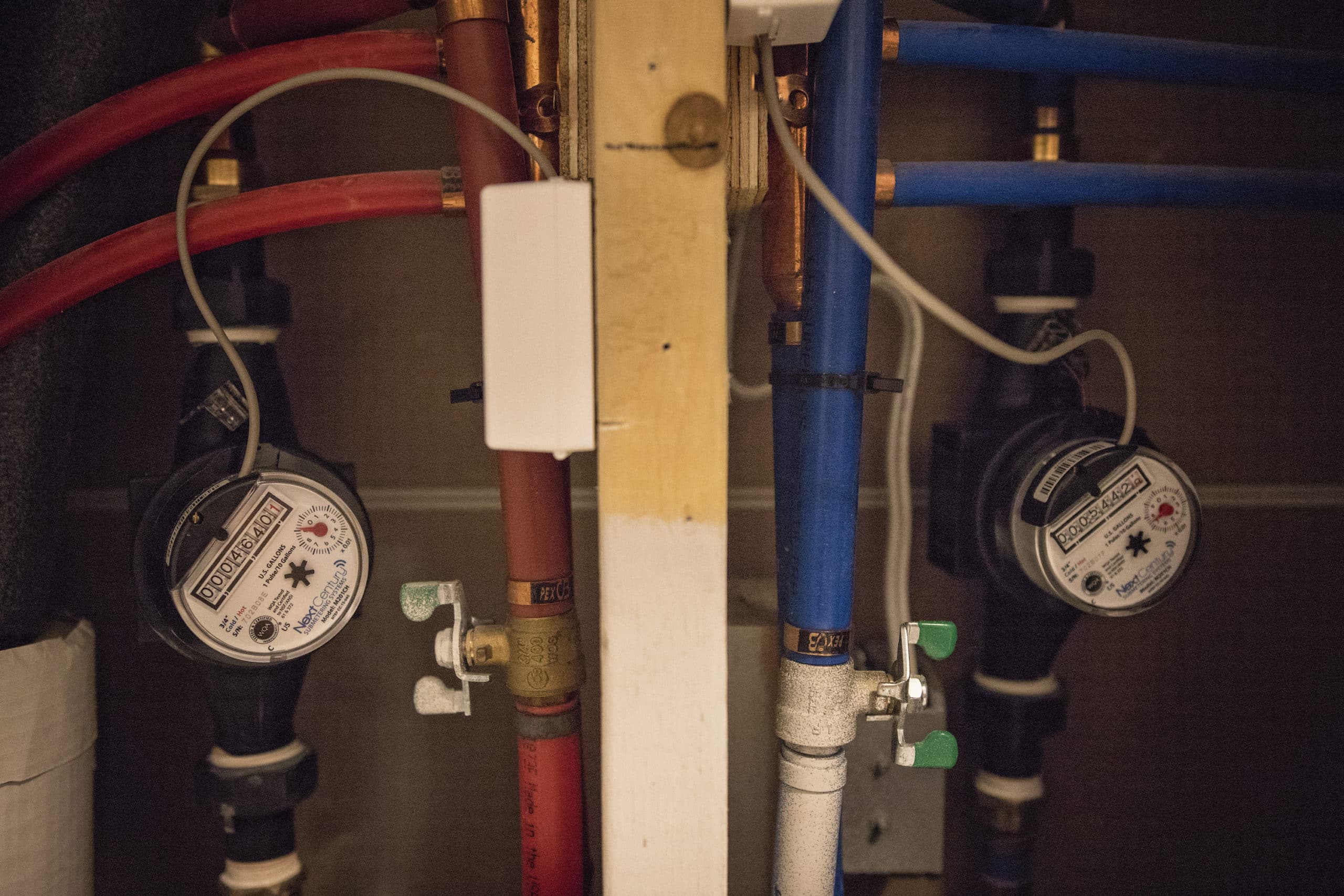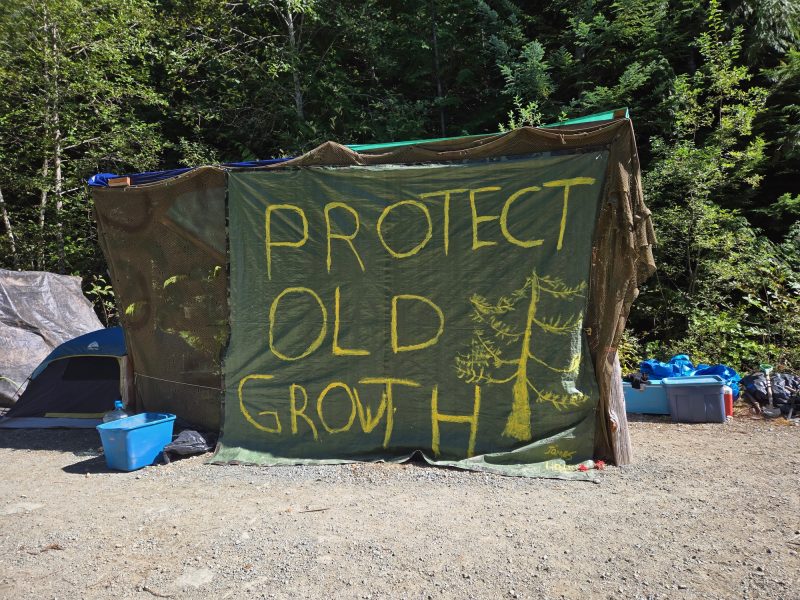
A couple of months ago I was contacted by a Nanaimo renter named Richard Pullano.
He had seen the series we had written for The Discourse on Nanaimo’s rental crisis and noticed our mention of the emergence of real estate investment trusts, which have been steadily buying up rental units all over Canada.
One of the major players, Starlight Investments, owns the Bluestone Apartments complex Pullano lives in with his wife, as well as about 20 other apartment buildings in Nanaimo.
Could I look into his situation, he asked?
In May of last year they moved from Gabriola Island into their Linley Valley Drive apartment; that summer, a company called Wyse Meter Solutions installed water submeters to monitor and bill their water consumption in all the apartments in his building.
Pullano says his concerns started when he received his first bill.
“In October, we get a bill for $495. For water. Which includes some one-time charges for setup, and includes sewer,” he says, though Wyse has not installed sewer meters but rather assume the amount based on water consumption.
Sewer charges were included with rent in his lease agreement, which he forwarded to Wyse, and they agreed to correct it. But that wasn’t the only charge that had him scratching his head.
“There’s something called a Water Utility Service Fee, this service fee was $130. And I said, ‘What’s the service fee for?’” says Pullano, who called Wyse and was told by the customer service representative that it was a monthly fee that had accrued over the previous five months.
“My gut feeling is that it’s just a money grab,” he adds. “Anybody that I’ve talked to says, ‘Well why would they put meters in?’ I mean if it was a three or four unit place in a house you could each have your own meter and it would be between you and the city. But for a third party utility to be subcontracted to provide this water… They don’t own it. They don’t do anything. They just bill.”
(The company says the additional fees cover its operational costs.)
Other residents have expressed their confusion around Wyse’s role in general, as well as the water bill charges.
When I spoke to Jenai Brown, a single mother who moved into Bluestone from Kelowna at the beginning of July, she said she didn’t realize water wasn’t included in her utilities until she was actually signing the lease, but wasn’t too worried about it.
“Water and electricity is not that much for a little condo, I’ve paid for it before in the past for a similar size [rental], so I’m thinking it’s probably max 50 bucks a month in the wintertime,” she says.
During the apartment walk-through prior to moving in, she claims a representative from management company Devon Properties told her that the programming for the water meters would take a few months, and none of the tenants would be charged for water until it was completed. When it was finished, they would be informed, and then charged from that day forward.
“So I didn’t worry about water until I got my first bill in October, and I get this bill — it’s almost $500. And I’m just blown away,” she says. “What got me was that they decided to back charge me from the day that I moved in. So I’ve been fighting with Devon and I said, ‘No, this is not what you guys told everybody.’”
In an Oct. 26 email to Devon, Brown attempted to address these issues and others, stating that her bill was “a mess and completely unorganized,” and that she was not paying until it was sorted out. “I also don’t want to deal with Wyse, I feel like I don’t have a choice about what utility bills I use. I’d rather deal with the City of Nanaimo.”
She has yet to receive a response from either Wyse or Devon. A representative from Devon did not respond to multiple requests for comment.
One of the charges on Brown’s bill was for sewage, which like Pullano, was supposed to be included in her rent, according to her lease. (Wyse has since removed Brown’s sewer charges.) The security deposit for the water submeter was also a different amount than stated in her lease, and there were monthly fees that exceeded the amount charged for water.
“[My] water bill isn’t even $30 a month, so that’s not adding up. [My] administration fee is more than the actual bill itself. So what is the administration fee covering?” she said, referring to the $101.57 Water Utility Fee charge listed on her October bill. The bill also included a “one-time account setup fee” of $50.

“We charge the exact same rate [for water] as the landlord is charged for the utility,” says Wyse CEO Peter R.J. Mills, when reached via email. “Our Water Utility Service Fee, sometimes referred to as a Delivery Fee, is an added cost to resident bills that accounts for various aspects of our operations.”
When asked to break down what those operations are, Mills said that in Nanaimo the fee is an all-in cost of approximately $30 per month, noted on each bill, and covers “costs associated with customer service, rate calculation, bill generation, and bill payment processing. It also includes a meter fee (issued per suite), a bad debt recovery fee, and a regulatory administration fee.”
The water bills provided by residents of Bluestone show the rate Wyse charges for water does generally match the city rate. On some bills it appears the Water Utility Service Fee exceeds the cost of water, and on others it is roughly the same.
Mills also acknowledges that there was a “lack of clarity” around the inclusion of utilities with some residents at Bluestone, as well as a “technical error” on some residents’ bills regarding sewage and that refunds have been issued accordingly.
As to why this “all-in-cost” varies from person to person, Mills says the rates are based on a 30 day billing period and vary accordingly with different months, however it’s not clear exactly how they calculate it.
What is water submetering?
How submetering works is that the owner of a residential building is charged in bulk for the water (or electricity, or gas) it receives from the city, and then each suite is metered individually for what they use, with the tenant charged accordingly by a third party company (in this case, Wyse).
The primary benefit of splitting the bills is that it allows landlords to offload the rising cost of utilities onto renters and skirt around rent increase limits, according to industry proponents. The practice is also touted as an opportunity for tenants to control and reduce their consumption and only pay for what they use. For these reasons, some jurisdictions require the installation of submeters in multi-family residential buildings, and other jurisdictions like the Region of Waterloo have rebate programs to encourage their use.
With Wyse, meters are often installed “at no cost to the owner” — and instead the cost is passed off to the tenant through a monthly charge, the company explains via a blog post on their website. “The residents will not see this customer charge: it will only be one element of a line called ‘delivery charge’ as required by provincial rules.”
Because most landlords don’t then lower rents accordingly once they submeter (and residents are now paying for their own utilities), “the entire utility cost per unit goes straight to their bottom line in savings,” adds Wyse.
Wyse has received criticism for its submetering practices before. In Ontario, it was forced to change how fees were disclosed on bills after a Global News investigation uncovered a number of discrepancies in their billing practices.
In one case, they were charging students more than double the regular rate for gas, electricity and water without having even installed submeters in any units. In another, they were found to be charging more than the municipal rate for water and separately billing roommates the same total fee, even though they all lived in one unit, with one meter.

Is water submetering legal?
Though BC Hydro has regulations around the metering and resale of electricity, it appears that there is virtually no provincial or federal oversight when it comes to the resale of water.
“The province of British Columbia currently has no regulations in place specific to water submetering,” confirmed Mills, Wyse’s CEO, via email. “We do act in accordance with standards set out by the American Water Works Association which relate to all areas of water treatment and supply.”
Curious about what regulation existed to ensure the accuracy of water meters like Wyse’s, I contacted Measurement Canada. They’re the federal agency responsible for making sure that measured goods sold in Canada are accurate, as well enforcing and inspecting the devices used to measure them.
“Water meters are actually exempt from requiring approval and initial inspection. So, unlike scales or gas pumps for gas, for example — those need to be approved and eventually inspected,” says Joseph Kakish, senior inspector with weights and measures at Measurement Canada, who then referred me to the weights and measures legislation that water falls under. “Anything to do with water is more of a provincial and a municipal [issue].”
When I phoned Dale Lindsay, the general manager of development services for the City of Nanaimo, he had a similar reply — essentially the city supplies a building with water, and whatever happens after that point is not within their control.
“We have one meter which we own and we’re responsible for, and we bill the property — whoever owns the property. We don’t have any regulations on it. It’s simply one meter to a property,” he said, adding that the city “doesn’t have any jurisdiction on private property for water.”

When I talked to the residents at Bluestone, the same question came up again and again: If I think I’m being ripped off, who do I go to? Who’s in charge?
“As I understand it, as long as they’re getting their water legally and distributing it legally, they can do whatever they want with that water. They can sell it, they can let people resell it,” says Bluestone resident Jon Galliazzo. “That’s how they make money,” adding they charge utility fees that are at times more than the actual utility cost. “That’s how they make a profit.”
When asked about this, Mills reiterated that the company adheres to the water rate as set by the city, and that “Wyse’s revenue is derived from within our monthly administration fees, which includes our meter fee.”
Galliazzo feels that Wyse has no right to bill him, and that they need to clarify the “vague” charges on his bills and provide documentation as to the legal framework they operate within or he’s not paying them.
Wyse has since sent disconnection warnings to Galliazzo (which, strangely, threaten to cut off his electricity, even though his electricity is paid for separately through B.C. Hydro). Included with this notice was a pamphlet with tips on having no electricity, such as how to be fire safe when using alternative heating methods.

As a risk mitigation against rising utility costs, Galliazzo says he understands Starlight’s motivations in hiring a submetering company, but ultimately though it represents a very small portion of Starlight’s finances, it by contrast represents “a massive part of my budget.”
On full disability benefits, Galliazzo says he simply cannot afford any extra costs, nor is moving out an option.
“I’m scared to do anything because I can’t afford to move. I can’t afford to get evicted. And I know I’m not doing anything that I should get evicted for, but landlords like this are really good at walking that line,” he says. “So I’m scared about Devon. I’m scared about them letting somebody from Wyse — or they themselves—actually cutting off my water. I don’t know what would happen.”
Can tenants’ utilities be cut off?
For this question I went to the provincial Residential Tenancy Branch, who also do not regulate third-party submetering companies like Wyse. They referred to David Eby’s office as the Attorney General and Minister Responsible for Housing.
Under the Residential Tenancy Act, “landlords must provide and maintain services that are essential to the health and safety of the tenant, including water and electricity,” says a representative from the ministry, in an email response to my questions. “However, the Act does not have specific provisions about whether third-party companies can provide these services.”
What it essentially comes down to is whether the landlord or the tenant is responsible for providing utilities. If the tenant is responsible and they enter an agreement with a service provider, then that provider “could decide to cancel the service,” says the representative.
If the landlord is the one responsible for providing utilities, they cannot cut off a tenant’s water or hydro for non-payment without a court order. However, in the event of non-payment, the landlord can begin eviction proceedings.
What are tenant’s rights when it comes to water submetering?
Though submetering is still a fairly new practice in B.C., tenant advocates are now beginning to see it surface in disputes between renters and landlords.
“The first time we heard about that recently was a landlord here in Vancouver who was doing it with electricity. It was pretty clear that they had incorporated their own little subcompany to do electricity submetering and they were adding massive administrative fees,” says Robert Patterson, a legal advocate and lawyer with the Tenant Resource and Advisory Centre (TRAC).
“That did not work, because number one, it was very obviously not an arms-length deal between this submetering company and the landlord. It was pretty clear it was the landlord, just with a different mask on. And number two, the B.C. Utilities Commission — there are actually rules they have about submetering electricity — so that landlord shut that down pretty quickly.”
Since then, most of the stories TRAC has heard about have mostly originated from Vancouver Island, and like Bluestone, have involved water submetering in properties owned by large institutional landlords such as Starlight, says Patterson.
Patterson echoes what the Ministry says: if tenants have a tenancy agreement that water is included within their rent, they likely cannot be forced to accept submetering by a third party.
He adds that TRAC has recently heard of cases where tenants were presented with new lease agreements as though they were regular renewals, but in fact changes to the lease required them to pay water fees.
“It’s a thing where there’s nothing about it that is clearly illegal under the Residential Tenancy Act (RTA). There might be some kind of room for creative arguments about whether these kinds of terms or contracts are unconscionable, but that’s something that would have to be tested at the Residential Tenancy Branch and ultimately an arbitrator would have to determine it,” he says.
The problem is that there is a lack of a regulatory framework — because there is nothing within the RTA that specifically pertains to the regulation of utilities, it means tenants and landlords can essentially come up with their own contracts, says Patterson.
“That’s ultimately the problem. If there was regulation that prevented this kind of administrative fee gouging, then you would be able to point to it,” he says. “That’s the great success of the Utilities Commission’s approach to electricity. I guess one important question that should probably be asked is, ‘Why aren’t we doing the same with water and other essential services?’ It’s likely because no one’s really tried to gouge on water before.”



